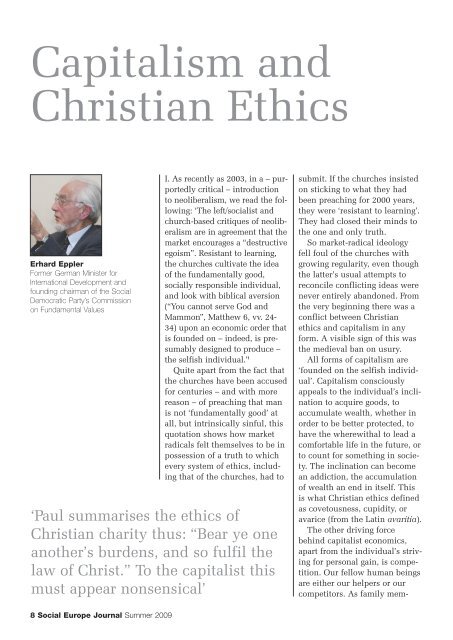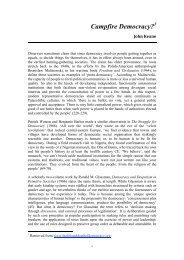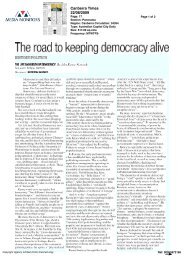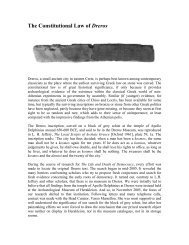The Ethics of Capitalism - Social Europe Journal
The Ethics of Capitalism - Social Europe Journal
The Ethics of Capitalism - Social Europe Journal
Create successful ePaper yourself
Turn your PDF publications into a flip-book with our unique Google optimized e-Paper software.
<strong>Capitalism</strong> and<br />
Christian <strong>Ethics</strong><br />
Erhard Eppler<br />
Former German Minister for<br />
International Development and<br />
founding chairman <strong>of</strong> the <strong>Social</strong><br />
Democratic Party’s Commission<br />
on Fundamental Values<br />
I. As recently as 2003, in a – purportedly<br />
critical – introduction<br />
to neoliberalism, we read the following:<br />
‘<strong>The</strong> left/socialist and<br />
church-based critiques <strong>of</strong> neoliberalism<br />
are in agreement that the<br />
market encourages a “destructive<br />
egoism”. Resistant to learning,<br />
the churches cultivate the idea<br />
<strong>of</strong> the fundamentally good,<br />
socially responsible individual,<br />
and look with biblical aversion<br />
(“You cannot serve God and<br />
Mammon”, Matthew 6, vv. 24-<br />
34) upon an economic order that<br />
is founded on – indeed, is presumably<br />
designed to produce –<br />
the selfish individual.’ 1<br />
Quite apart from the fact that<br />
the churches have been accused<br />
for centuries – and with more<br />
reason – <strong>of</strong> preaching that man<br />
is not ‘fundamentally good’ at<br />
all, but intrinsically sinful, this<br />
quotation shows how market<br />
radicals felt themselves to be in<br />
possession <strong>of</strong> a truth to which<br />
every system <strong>of</strong> ethics, including<br />
that <strong>of</strong> the churches, had to<br />
‘Paul summarises the ethics <strong>of</strong><br />
Christian charity thus: “Bear ye one<br />
another’s burdens, and so fulfil the<br />
law <strong>of</strong> Christ.” To the capitalist this<br />
must appear nonsensical’<br />
submit. If the churches insisted<br />
on sticking to what they had<br />
been preaching for 2000 years,<br />
they were ‘resistant to learning’.<br />
<strong>The</strong>y had closed their minds to<br />
the one and only truth.<br />
So market-radical ideology<br />
fell foul <strong>of</strong> the churches with<br />
growing regularity, even though<br />
the latter’s usual attempts to<br />
reconcile conflicting ideas were<br />
never entirely abandoned. From<br />
the very beginning there was a<br />
conflict between Christian<br />
ethics and capitalism in any<br />
form. A visible sign <strong>of</strong> this was<br />
the medieval ban on usury.<br />
All forms <strong>of</strong> capitalism are<br />
‘founded on the selfish individual’.<br />
<strong>Capitalism</strong> consciously<br />
appeals to the individual’s inclination<br />
to acquire goods, to<br />
accumulate wealth, whether in<br />
order to be better protected, to<br />
have the wherewithal to lead a<br />
comfortable life in the future, or<br />
to count for something in society.<br />
<strong>The</strong> inclination can become<br />
an addiction, the accumulation<br />
<strong>of</strong> wealth an end in itself. This<br />
is what Christian ethics defined<br />
as covetousness, cupidity, or<br />
avarice (from the Latin avaritia).<br />
<strong>The</strong> other driving force<br />
behind capitalist economics,<br />
apart from the individual’s striving<br />
for personal gain, is competition.<br />
Our fellow human beings<br />
are either our helpers or our<br />
competitors. As family mem-<br />
8 <strong>Social</strong> <strong>Europe</strong> <strong>Journal</strong> Summer 2009







